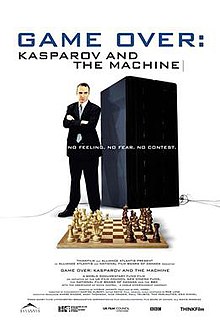Game Over: Kasparov and the Machine
| Game Over: Kasparov and the Machine | |
|---|---|

Theatrical release poster
|
|
| Directed by | Vikram Jayanti |
| Produced by | Hal Vogel |
| Starring |
Joel Benjamin Michael Greengard Anatoly Karpov Garry Kasparov Jeff Kisselhof |
| Narrated by | Marc Ghannoum |
| Music by | Robert Lane |
| Cinematography | Maryse Alberti |
| Edited by | David G. Hill |
| Distributed by | THINKFilm |
|
Release date
|
|
|
Running time
|
90 minutes |
| Country | Canada United Kingdom |
| Language | English |
Game Over: Kasparov and the Machine is a 2003 documentary film by Vikram Jayanti about the match between Garry Kasparov, the highest rated chess player in history (at the time) and the World Champion for 15 years (1985–2000), and Deep Blue, a chess-playing computer created by IBM. It was coproduced by Alliance Atlantis and the National Film Board of Canada.
Kasparov had beaten Deep Blue, a computer designed specifically to beat him, in a match played in 1996. He agreed to offer a rematch the following year. Kasparov won the first game of the rematch easily with the white pieces. In the second game, Kasparov was struggling with the black pieces, but set a trap that most computers fall for. Deep Blue didn't fall for it and won to level the match. At the time it was reported that both Kasparov and Deep Blue missed a perpetual check that could have given Kasparov a draw, but today strongest computer chess engines, for example , which are stronger than every human, don't consider the final position as draw, but as having better winning chances for white, contradicting the human analysis at the time that Deep Blue missed a perpetual check. The next three matches ended in draws, with Kasparov appearing to weaken psychologically. Deep Blue went on to win the decisive sixth game, marking the first time in history that a computer defeated the World Champion in a match of several games.
From this experience, particularly the second game of the match, Kasparov accused the IBM team of cheating. He suspected that a human player was used during the games to improve the strategic strength of the computer. As a metaphor for this suspicion, the film weaves in the story of the Turk, a hoax involving a chess-playing automaton built in the eighteenth century, but secretly operated by human beings. The film also implies that Deep Blue's heavily promoted victory was a plot by IBM to boost the company's market value.
Game Over: Kasparov and the Machine received mixed reviews from critics. Among the positive reviews, Lou Lumenick of the New York Post called Game Over a "solid documentary" that's "fairly suspenseful." Dennis Lim of the Village Voice called Game Over a "gripping documentary." Jami Bernard of the New York Daily News called it "a nail-biter."
...
Wikipedia
